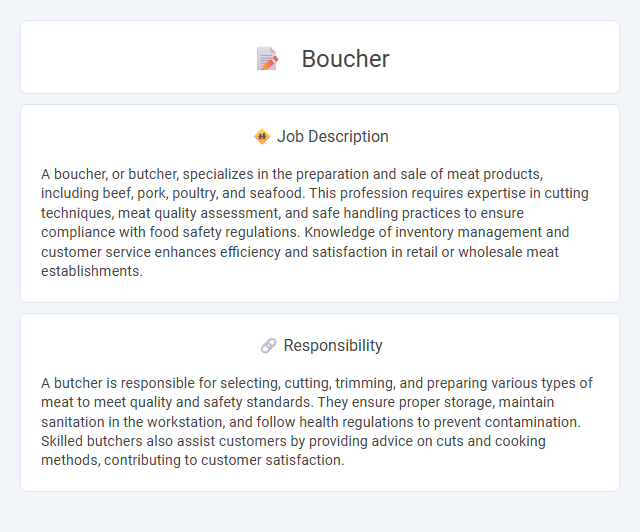
A boucher, or butcher, specializes in the preparation and sale of meat products, including beef, pork, poultry, and seafood. This profession requires expertise in cutting techniques, meat quality assessment, and safe handling practices to ensure compliance with food safety regulations. Knowledge of inventory management and customer service enhances efficiency and satisfaction in retail or wholesale meat establishments.
People with strong physical stamina and attention to detail may be well-suited for a butcher job due to its demanding, hands-on nature and the requirement for precise cutting skills. Those with a sensitivity to working with raw meat or in cold environments might find the job challenging or less suitable. Experience or training in food safety and hygiene could increase the likelihood of success in this profession.
Qualification
A butcher must possess comprehensive knowledge of meat cuts, food safety standards, and hygiene protocols to ensure product quality and customer safety. Formal training through vocational courses or apprenticeships, combined with certifications such as ServSafe or HACCP, enhances a butcher's qualifications and expertise. Proficiency in using specialized tools and understanding meat grading systems is essential for precise cutting and maximizing product value.
Responsibility
A butcher is responsible for selecting, cutting, trimming, and preparing various types of meat to meet quality and safety standards. They ensure proper storage, maintain sanitation in the workstation, and follow health regulations to prevent contamination. Skilled butchers also assist customers by providing advice on cuts and cooking methods, contributing to customer satisfaction.
Benefit
Boucher jobs likely offer benefits such as stable employment due to consistent demand for meat processing in the food industry. Employees may have opportunities to develop specialized skills, enhancing job security and potential for advancement. The role might also provide physical activity and the satisfaction of contributing to food supply chains, which can improve overall job satisfaction.
Challenge
The job of a butcher likely involves significant physical demands and precision, presenting challenges in maintaining consistent product quality. There is a probability that working with sharp tools and heavy machinery requires constant attention to safety protocols. Managing inventory and meeting customer expectations may also challenge efficiency and time management skills.
Career Advancement
A career as a boucher offers significant advancement opportunities through mastering meat cutting techniques and gaining expertise in food safety regulations. Progression can lead to supervisory roles, such as head butcher or meat department manager, where leadership and inventory management skills are essential. Continuous training in specialty meat preparation and customer service enhances prospects for higher-paying positions and business ownership within the meat industry.
 kuljobs.com
kuljobs.com